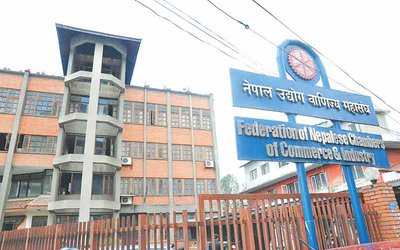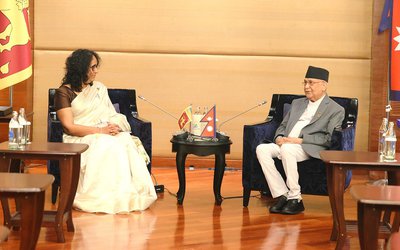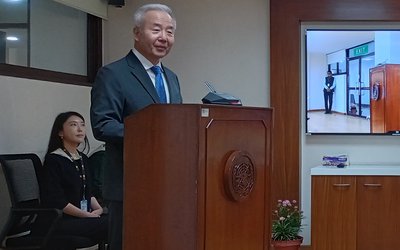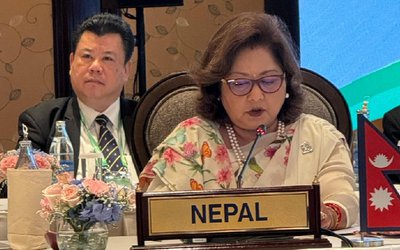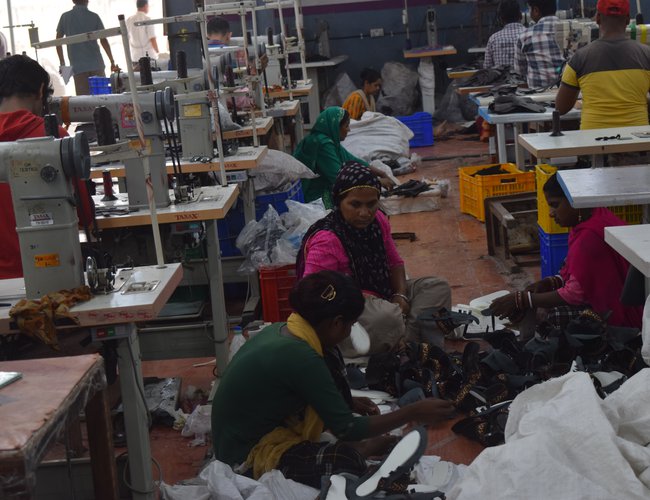
Mayor Kailash Kumar Ale, who is currently in his second term as the Mayor of Bhojpur Municipality, is committed to making a long-lasting impact. To tackle the challenges posed by a lack of skilled manpower, ineffective training programs, insufficient human resources institutions and regulations, and employment difficulties, Mayor Ale views the Samriddhi project as a lifeline.
During his second term, Mayor Ale has already formed a partnership with Samriddhi and has endorsed the proposed Technical and Vocational Education Training Guidelines by the executive board. At a time when local governments, including Bhojpur, are striving to establish new institutions, laws, regulations, and guidelines to effectively exercise their constitutional power for the benefit of the people, the Samriddhi project provides practical solutions.
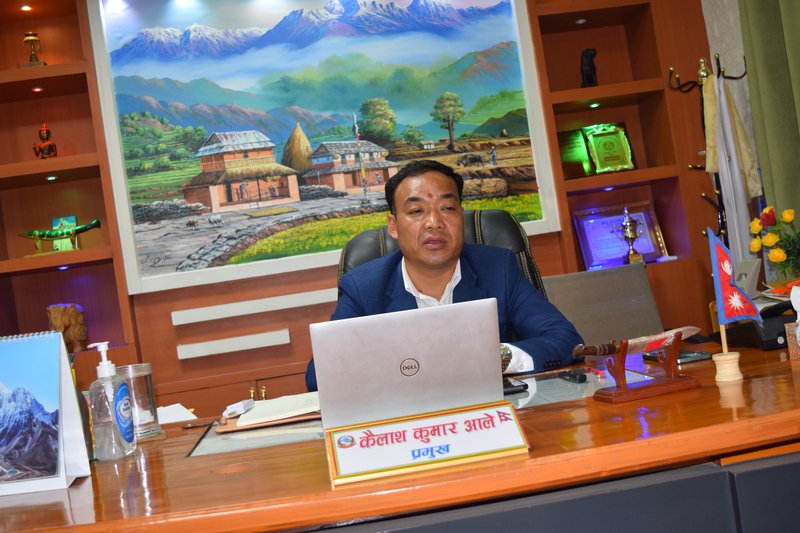
Mayor Ale
"By having a dedicated person and institution within the municipality, along with the TVET Guidelines, we can now support project proposals that cater to our local needs. Moreover, the focal point enables us to monitor the trainings and keep records of the trainees," Mayor Ale stated. He also expressed his admiration for the training programs and other initiatives implemented by Samriddhi.
"With the technical support of Helvetas-Nepal's team working under Samriddhi, Bhojpur Municipality's TVET Guidelines 2080 serve as a valuable tool for evaluating Technical and Vocational Training," Mayor Ale concluded.
Mayor Ale is not the only one making progress; Sanjaya Kumar Tumbahaphe, mayor of Mangling Municipality in Terhathum District of Province 1, has taken several steps forward. By signing partnership agreements and contributing to the cost of TVET sharing, the mayor has shown his support for the project.
Similarly, Kalpana Kumari Katuwal, mayor of Barathawa Municipality in Madhesh Province, has also been inspired by the concept of Samriddhi. Mayor Katuwal, a woman in a male-dominated society, has taken the initiative to introduce TVET Guidelines at the Executive Board level.
"We have a draft of the TVET Guidelines document, and the Municipal Executive Board will soon endorse it for implementation. These guidelines are essential for providing quality skill training. Samriddhi's team has already provided us with the document," said Katuwal. "We have a large number of unskilled women working in agriculture and other sectors. These guidelines will benefit them the most."
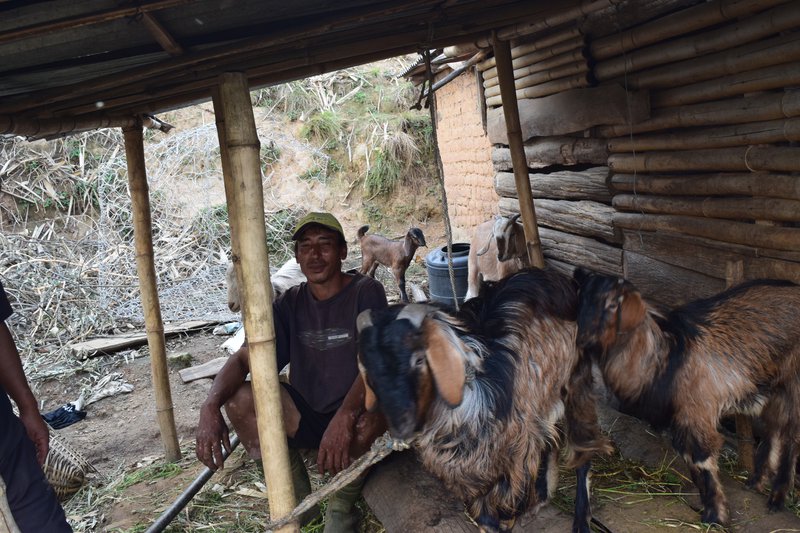
The trainings conducted under the Samriddhi project, in close collaboration with local governments and using a result-based financing approach, are proving to be beneficial for the trainees. "During my seven-year tenure as mayor, numerous training sessions have been held in various areas of my municipality."
Mayor Ale highlighted the lack of institutional memory regarding trained individuals and their specific areas of training. However, the municipality does maintain records of those who have completed vocational skill training, including their names, locations, and areas of expertise.
Khagendra Khadka, the focal person of Bhojpur Municipality, oversees various tasks such as issuing notices, conducting training, and follow-ups. Throughout the entire process, from selection to completion, there is constant monitoring and evaluation. Khadka also promotes women's participation in training programs and supports them in successfully completing the courses.
Ganga Bardewa, an active and dynamic focal point of Myanglung Municipality, possesses detailed information about the trainees, including their names, addresses, and current status. Bardewa closely monitors the progress of the trainees and assists them in accessing financial institutions if they plan to establish their own businesses. The municipality also maintains records of the trainees' names, addresses, and specialized training areas, while providing material support to the graduates, requiring thorough supervision.
The project "SAMRIDDHI," a collaboration between the Ministry of Industry, Commerce and Supplies and the International Fund for Agricultural Development (IFAD), has been in progress for seven years and is now in its final phase. Despite encountering challenges in the past, the project has shown significant advancements in the last couple of years, as recognized by IFAD's assessment team in their recent report.
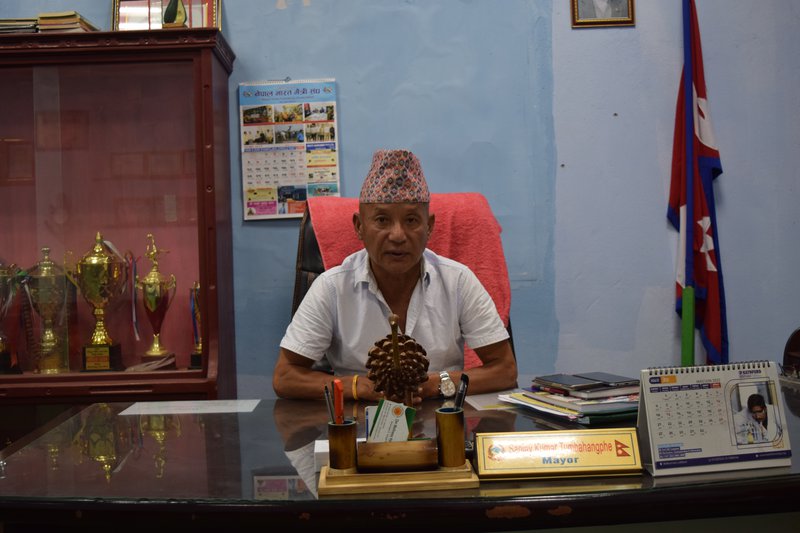
Mayor Tumbahamphe
Similarly, Itahari Sub-Metropolitan City has formed partnership agreements, mirroring similar collaborations in three other local governments: Harion and Barahathwa Municipalities in the Madhesh Province, and Duhabi Municipality in the Koshi Province. These partnerships underscore the project's commitment to improving Technical and Vocational Education and Training (TVET) across local governments in the federal setup. Since the enactment of the new constitution in 2015 and the federalization of Nepal, local governments have gained substantial power and authority. However, due to a lack of institutional capacity and legislation, they are unable to fully leverage these powers for the welfare of the populace.
In response to this challenge, the Executive Board of Bhojpur Municipality has endorsed Technical and Vocational Education Training Guidelines. These guidelines will serve as a blueprint for all forthcoming training programs conducted within the municipal boundaries.
Saroj Prasad Guragain, the Project Manager, highlighted the significance of collaborating with local level governments. He emphasized that not only are they learning from our project, but the federal government is also learning from them. The decision of municipalities to establish focal point offices and implement the TVET Guidelines, along with various agencies conducting skill trainings in the local areas, will bring about a substantial change.
Throughout the project period until 2023, this initiative has been implemented across 139 municipalities in three provinces. Out of these, a total of 12 municipalities have entered into a collaborative partnership agreement to jointly finance the training program. These municipalities have actively participated in the entire process, from selecting candidates to monitoring and verifying the outcomes using result-based modalities.
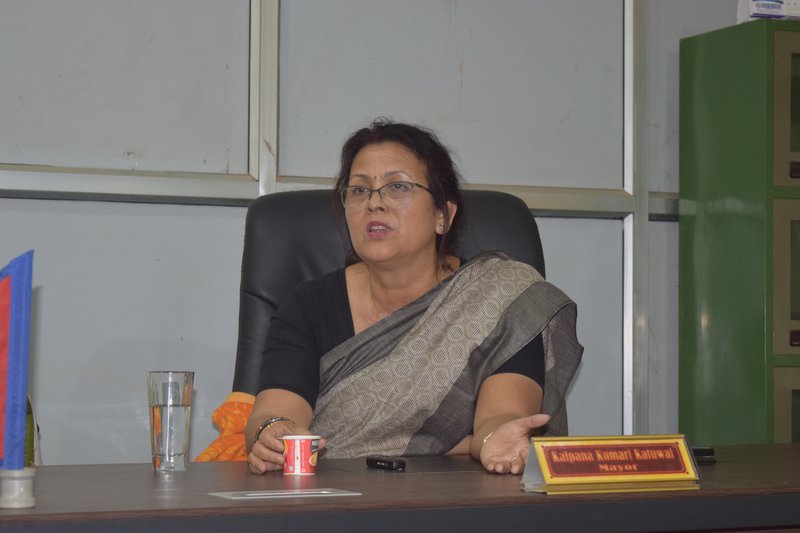
Mayor Katuwal
Furthermore, four municipalities have already allocated a budget to provide tools and equipment to the graduates, which demonstrates the increased involvement of local governments in driving progress.
Given Nepal's new governance structure, which includes Federal, Provincial, and Local levels, it is crucial for all institutions, rules, regulations, guidelines, and human resources to function effectively. Helvetas-Nepal, through the Samriddhi Project, has been providing technical and other forms of support to enhance the capacity of local governments.
Dr. Prabin Manandhar, the country director of Helvetas Nepal, has emphasized the importance of Technical Education and Vocational Training (TVET) in addressing youth employment. He expressed his satisfaction in witnessing local governments benefiting and learning from the project.
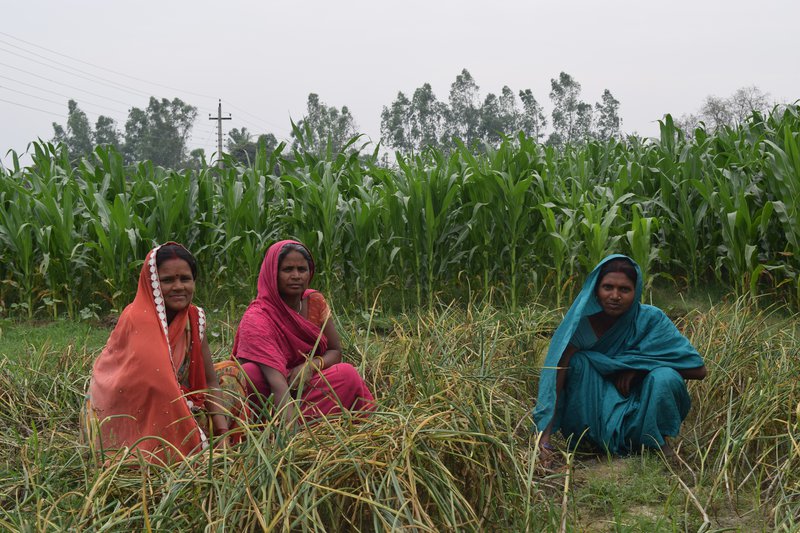
The partnership approach has yielded positive results in Itahari Sub-Metropolitan and Duhabi Municipality of Koshi Province, as well as in Harion and Barahathwa Municipalities in the Madhesh Province. Surveys conducted in these areas have shown the success of collaborative efforts in enhancing TVET programs. Sandip Poudel, the team leader of Helvetas Nepal in the Samriddhi project, highlighted the project's commitment to improving TVET programs across various local governments within the federal framework.
Over the past year, there has been a notable increase in collaboration with local authorities, focusing on areas such as policy adoption, migration policies, VST delivery, agricultural strategies, and commodity-specific policies. Poudel mentioned that more than 30 policies and guidelines have been officially adopted by partner local governments, with expectations of further increases in the coming months.
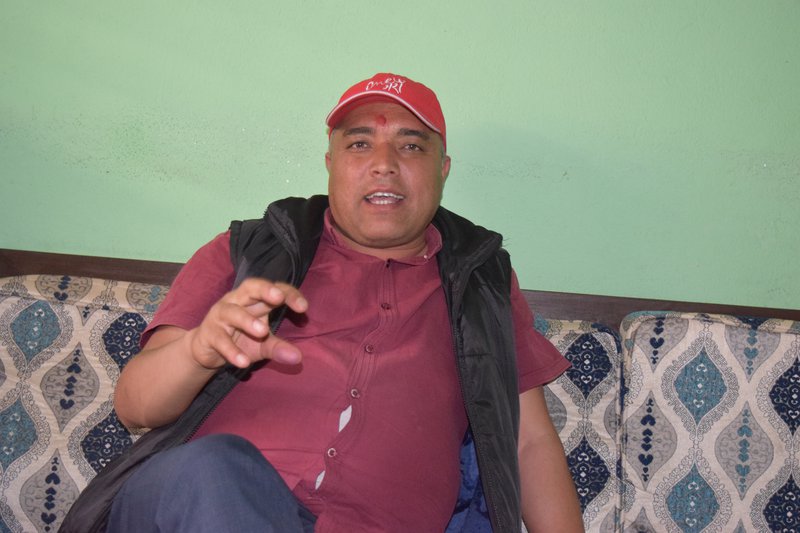
Focal Point Khadka
Moreover, Palikas are already offering co-financing for various initiatives in their respective regions. These initiatives include the establishment of Migration Resource Centers (MRCs), Supply Chain (SC) Development, Vocational Skills Training (VST), Financial Education and Enterprise Knowledge (FEEK), and the Gender Action Learning System (GALS).
The evaluation report conducted by IFAD also highlighted a significant achievement in completing Round 3 of the project. This particular round was implemented in 96 out of 208 municipalities, with 62 municipalities receiving training announcements through their own websites.
Poudel emphasized the importance of joint-partnership agreements, with 12 municipalities fully committing to co-finance the training and actively participating in the entire process. This involvement includes candidate selection, monitoring, and verification using result-based approaches.
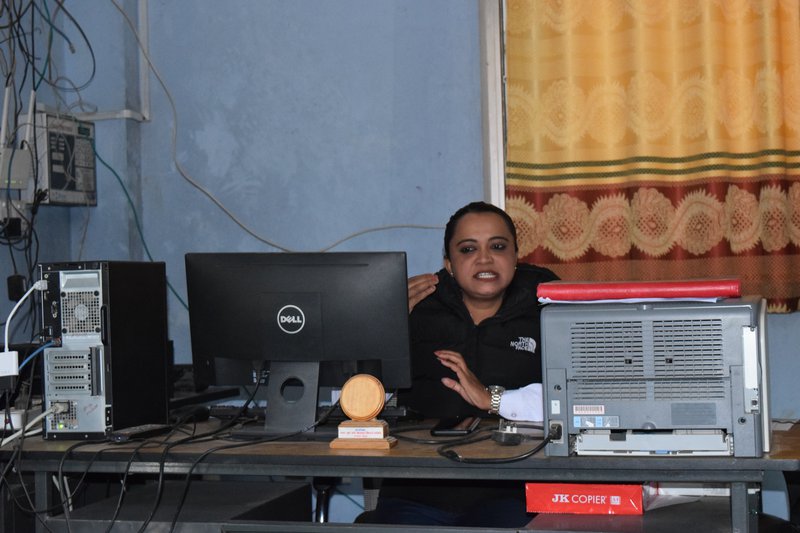
Focal Point Bardewa
One of the most encouraging aspects of the project is that four municipalities have already allocated funds for tools and equipment for graduates. The increased support from local authorities has successfully advanced the crucial goal of enhancing the participation of women in higher-paying non-traditional trades.
As the current phase of the project nears its conclusion, Samriddhi is proactively addressing challenges related to wage labor and the significant migration from rural to urban areas and abroad. Covering 16 districts in Koshi, Madhesh, and Bagmati Province, IFAD and the MoICS have positively impacted over 200,000 beneficiaries through financial education initiatives, reaching approximately 300,000 individuals.

Keshab Poudel
Poudel is the editor of New Spotlight Magazine.
- FM Dr. Deuba’s India Visit: Mission Aborted
- Mar 26, 2025
- AMBASSADOR MAEDA TORU: Warm Regards
- Mar 24, 2025
- PRO-MONARCHY MOVEMENT: Rising Dissatisfaction
- Mar 23, 2025
- Dr. PRABIN MANANDHAR: Person With Humility
- Mar 16, 2025
- US SUSPESION OF GRANT: Impact On Nepal
- Mar 10, 2025


